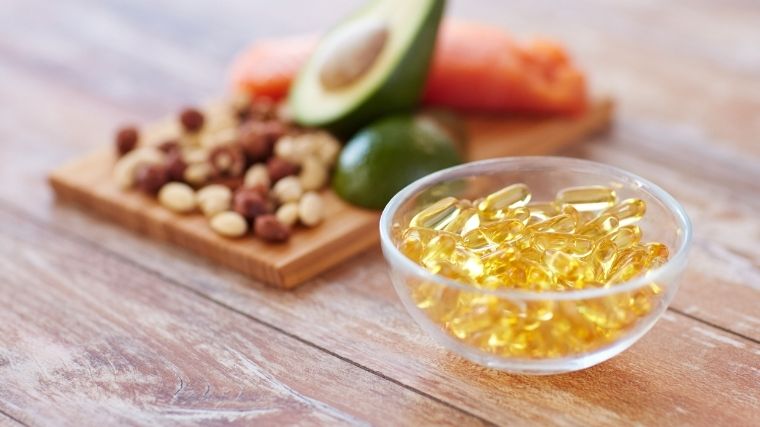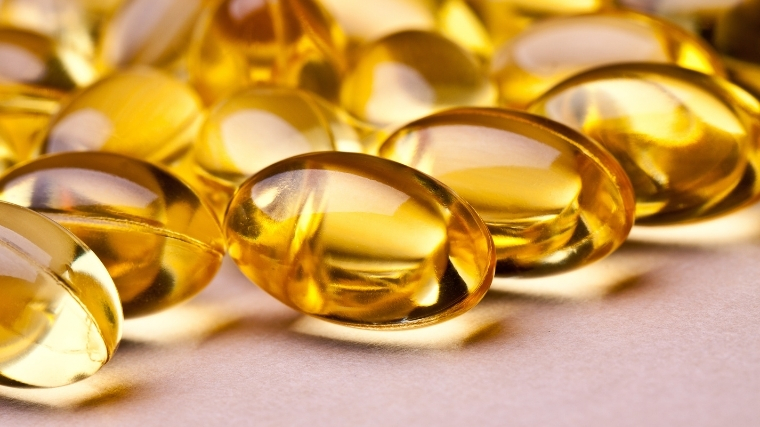“Eat more fish.” It’s the resounding chorus from just about every doctor and nutritionist out there. And no wonder: There have been literally thousands of studies published since the early 1970s showing that consuming more omega-3s (via fish or supplements) can reduce the risk of heart disease, ease joint pain and improve mood. (1)(2)(3)
That’s just scratching the surface of what omega-3s are thought to be able to do in the body. There’s also promising research showing the potential of high doses of omega-3s to reduce symptoms of ADHD in children, prevent age-related cognitive decline and slow the progression of Alzheimer’s disease. (4)(5)(6)
However, for all the talk of omega-3s, there’s surprisingly little information out there on the benefits that omega-3s can have for athletes and bodybuilders, but that changes now. Here, we break down what these healthy fats are, what they do in the body and how they can help you level up your workouts.

[Relaetd: The Best Whey Protein Powders for Vegans, Weight Loss, and More]
What Are Omega 3s?
Omega-3 fatty acids are a group of essential long-chain polyunsaturated fats that the body cannot produce independently. Omega 3s must be consumed through food, supplements, or drinks.
The two most studied and bioactive omega-3s are docosahexaenoic acid (DHA) and eicosapentaenoic acid (EPA). These omega-3s are mostly found in seafood (including fatty fish like salmon, tuna, anchovies, and mackerel, as well as shellfish, algae, and seaweed). They’re also in some other animal sources like grass-fed beef and dairy products. The body uses DHA and EPA to build cellular membranes (especially in the brain and eyes), produce hormones, and support many other important physiological functions.
The third type of omega-3, called alpha-linolenic acid (ALA), is found in certain plant foods — including flaxseed, walnuts, chia seeds, hemp seed, and canola oil. This type of omega-3 is generally used for energy, but ALA can be converted to EPA and DHA in minimal amounts, with reported rates of five to 15%.
How Do Omega 3s Work?
Omega-3 fatty acids have a long flexible structure that makes them ideal for building cellular membranes throughout the body, especially within the brain and the nervous system. As a component of cells, they serve as lubricants, facilitate better communication between cells, and aid in cellular metabolism and gene expression. In the brain, this translates to omega-3s working to optimize neuron function (aka sharper thinking), protect against cell death (aka staving off brain fog and cognitive decline), and boost output of the feel-good brain chemical serotonin and dopamine (improving your mood and motivation).
In other parts of the body, omega-3s work similarly: In muscles, omega-3s can improve nerve signaling, which helps strengthen muscle contractions, protect against muscle loss and aid in the production of hormones that are key to building new muscle fibers.

[Relaetd: The Best BCAA Supplements for Muscle Gain, Keto, and More]
Omega-3s also have powerful anti-inflammatory properties, with studies showing they can block inflammation through multiple pathways. This makes omega-3s such a superstar nutrient against heart disease risk factors, but this benefit can also help with workout recovery and reducing muscle soreness.
What Are The Benefits of Omega 3s?
There are numerous health benefits to be gained from omega-3s, as discussed in previous sections, but for the sake of this article, let’s look at the study-proven ways omega-3s enhance physical performance:
More Endurance
Omega-3s help strengthens and relaxes blood vessels by increasing the production of nitric oxide. This allows oxygen-rich blood to circulate more efficiently to the muscles and the heart, improving endurance and reducing fatigue during long workouts. In one study, this effect helped elite cyclists who supplemented with 1.3 grams of omega-3s daily over three weeks improve their maximum oxygen uptake (a key indicator of endurance) significantly more than those given a placebo. (7)
Increased Muscle Gains
There’s promising research coming out that shows omega-3s can actually increase mTor signaling, helping to increase lean muscle mass. Omega-3s also increase insulin sensitivity, which can further support muscle building. One study found that resistance-trained subjects who were given three grams of omega-3-rich krill oil increased lean body mass by 1.4 kilograms or 2.1% from baseline over eight weeks, whereas those on the same training program received a placebo saw no such gains. (8)
What’s more, omega-3s have shown to help protect against muscle loss, even during weight loss, helping to preserve your hard-won gains if you take a day off or if you’re cutting fat. (9) And because omega-3s also support mental focus and activity, they can also help strength athletes find the energy and concentration to push through more reps, leading to better lean muscle gains. (10)
Better Muscle Recovery
This is the area that omega-3s really shine. The anti-inflammatory properties of omega-3s reduce muscle damage and inflammation immediately after workouts, helping to curb delayed onset muscle soreness. (11)(12) This, in turn, can help you recover faster after a hard workout and get back to training faster.
What Are the Best Sources of Omega-3s?
Fish and other seafood are the best food sources of the omega-3s DHA and EPA. Top sources include cold-water fatty fish, such as salmon, sardines, tuna, herring, cod, trout, and mackerel. Seaweed, algae, and some shellfish such as shrimp and krill are also good sources.
[Related: The Best Pre-Workout Supplements for Strength, Cardio, and More]
Plant-based omega-3 in the form of ALA is found in walnuts, chia seeds, flaxseed, soybeans, hemp seeds, and kidney beans. Nutrition researchers recommend doubling the recommended intake of plant sources if no direct sources of EPA and DHA are consumed, given the low conversion rate of ALA to EPA and DHA. (13)
Who Needs Omega 3s?
Everyone! The body cannot make these healthy fats, so it’s important to get them through your diet. The FDA recommends that adults consume at least eight ounces or two palm-sized servings of fish per week to get the 500 to 1,000-milligram of omega-3s that the body needs to optimize basic physiological functions.
People who don’t eat fish regularly or follow a vegetarian or vegan diet may want to consider an omega-3 supplement. Look for fish or krill oil for the highest levels of DHA and EPA. Or algae-derived supplements are one of the best 100% vegan sources of DHA and EPA.
How Much Omega 3s Do You Need?
The RDA for omega-3s is 1.6 grams daily for adult men and 1.1g daily for adult women. For athletes, experts recommend aiming for one to two grams of omega-3s daily at a ratio of EPA to DHA of 2:1.

[Related: The Best Greens Powders For Protein, Weight Loss, and More]
Food sources are considered the best way to increase your omega-3 intake, but if you don’t eat fish or want an extra helping hand, there’s plenty of supplements on the market to choose from. Most omega-3 supplements are dosed at 1,000 mg of fish oil, with varying amounts of EPA and DHA, so you’ll want to read the label carefully and aim for at least 500mg total of EPA and DHA. Fish oil can go rancid quickly, so also pay close attention to the expiration date. Quality is key here.
The Bottom Line
Omega-3s have the power to help you push through workouts harder, go longer and bounce back faster, and that might just be the extra oomph you need to hit your lean gain goals. There are no known downsides to omega-3. And hey, if a few pieces of fish each week can help you hit that next bench press PR or push through the last rep, that’s a pretty good reason to put salmon on the menu tonight.
References
- DiNicolantonio JJ, et al. The Benefits of Marine Omega-3s for the Prevention and Treatment of Cardiovascular Disease. Mo Med. 2019 Sep-Oct;116(5):404-408
- Miles EA, et al. Influence of marine n-3 polyunsaturated fatty acids on immune function and a systematic review of their effects on clinical outcomes in rheumatoid arthritis. Br J Nutr. 2012 Jun;107 Suppl 2:S171-84.
- Lin PY, Su KP. A meta-analytic review of double-blind, placebo-controlled trials of antidepressant efficacy of omega-3 fatty acids. J Clin Psychiatry. 2007 Jul;68(7):1056-61.
- Heilskov Rytter MJ, et al. Diet in the treatment of ADHD in children – a systematic review of the literature. Nord J Psychiatry. 2015 Jan;69(1):1-18.
- Martí Del Moral A, Fortique F. Omega-3 fatty acids and cognitive decline: a systematic review. Nutr Hosp. 2019 Aug 26;36(4):939-949.
- Ajith TA. A Recent Update on the Effects of Omega-3 Fatty Acids in Alzheimer’s Disease. Curr Clin Pharmacol. 2018;13(4):252-260.
- Żebrowska A, et al. Omega-3 fatty acids supplementation improves endothelial function and maximal oxygen uptake in endurance-trained athletes. Eur J Sport Sci. 2015;15(4):305-14.
- Georges J, et al. The Effects of Krill Oil on mTOR Signaling and Resistance Exercise: A Pilot Study. J Nutr Metab. 2018 Apr 26;2018:7625981.
- Philpott JD, et al. Influence of Fish Oil-Derived n-3 Fatty Acid Supplementation on Changes in Body Composition and Muscle Strength During Short-Term Weight Loss in Resistance-Trained Men. Front Nutr. 2019 Jul 16;6:102.
- Ochi E, et al. Eicosapentaenoic Acid-Rich Fish Oil Supplementation Inhibits the Decrease in Concentric Work Output and Muscle Swelling of the Elbow Flexors. J Am Coll Nutr. 2019 Feb;38(2):125-131.
- Tinsley GM, et al. Effects of Fish Oil Supplementation on Postresistance Exercise Muscle Soreness. J Diet Suppl. 2017 Jan 2;14(1):89-100.
- Ochi E,et al. Effect of eicosapentaenoic acids-rich fish oil supplementation on motor nerve function after eccentric contractions. J Int Soc Sports Nutr. 2017 Jul 12;14:23. doi: 10.1186/s12970-017-0176-9.
- Saunders AV, et al. Omega-3 polyunsaturated fatty acids and vegetarian diets. Med J Aust. 2013 Aug 19;199(S4):S22-6
Featured image: Foxys Forest Manufacture/Shutterstock